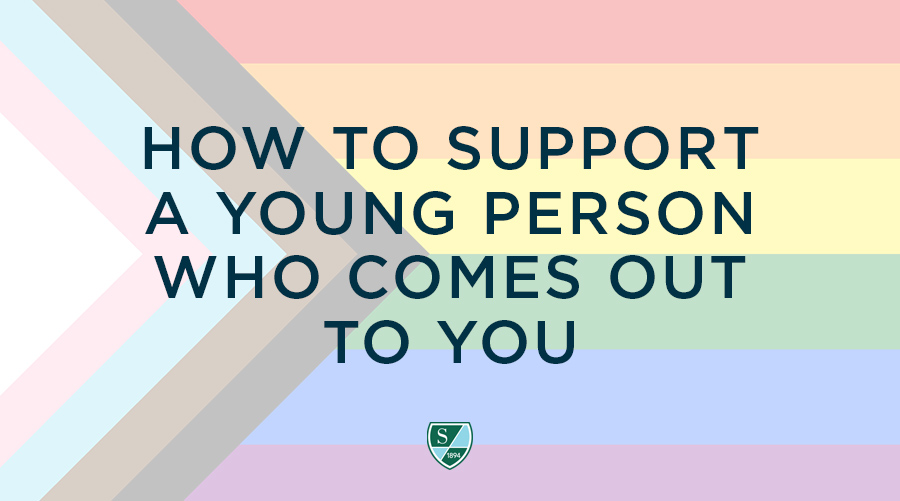October 11th is National Coming Out Day. It was started a year after the National March on Washington for Lesbian and Gay rights and has been a powerful reminder about the impact coming out can have for people. It’s estimated that about 10% of the population is LGBTQ+ (Williams Institute), so being able to support someone who has come out is incredibly important. In fact, it can be life-saving. According to the Center for Disease Control, LGBTQ+ youth are 3.5 times more likely to attempt suicide than their heterosexual peers. However, if they have just one supportive adult in their life, that risk decreases by almost 50% (Trevor Project).
As someone who has come out to many people, I wanted to share some ways to support the young people in your life if they come out. While some of this is based on personal experience, many of these tips come from GLSEN and the Human Rights Campaign. I highly recommend checking out both resources!
Tip 1: Say Thank You
I will never forget listening to Jabari Lyles, a GLSEN presenter, share his coming out tips to staff at my previous school. He described coming out as a gift, and whenever we get a gift, we should say thank you. When anyone comes out, they are trusting you with deeply personal information. Unfortunately, many also know that coming out can fundamentally change their relationships with their loved ones. So, please say thank you because they are sharing a precious gift with you. Coming out also takes immense bravery, and saying thank you subtly acknowledges that bravery.
Sentence frame: Thank you so much for trusting me and sharing this part of you with me.
Tip 2: Match Their Energy Level
It might be our first instinct to act really excited when someone comes out so we can convey how much we support them. However, acting TOO enthusiastic can actually make things really awkward and uncomfortable. Coming out shouldn’t be a big deal, but heterosexuality is so ingrained in our society that it is. While the media has shown positive coming out stories, it has also shown stories where kids get kicked out, disowned, etc., so their apprehension is valid. It’s best to match the energy level of your young person. If they’re excited to tell you, be excited with them! If they seem nervous, terrified, or have other apprehensive emotions, be mindful of your tone. You can convey love and support without going overboard.
Sentence frame (excited): I’m so happy that you feel confident and affirmed in this identity!
Sentence frame (apprehensive): I love you so much and am here to support you.
Tip 3: Avoid Making Assumptions
When the young person in your life comes out to you, please avoid saying things like, “I knew it” or “I thought something was up.” While many think these words offer comfort or help relieve stress, it can actually do the opposite. When we use these phrases, it signals to young people that we’ve made assumptions about them and who they are.
Tip 4: Ask How They Want to Tell Others
Coming out is a lifelong process, and it can be exhausting. It’s really important to check in with your young person and ask how they want to tell family, friends, teachers, etc. Their friends may already know, but a lot of times, the adults in their life do not. Some young people may want to tell family right away while others may want to wait. Some may want to do it themselves while others would prefer you to be the buffer. Please don’t tell people until your young person tells you it’s okay. Outing someone without their permission is never acceptable and can fracture their trust in you. You should also be prepared to field family questions and potential discomfort.
Sentence frames: Would you like to tell the family or would you like me to talk to them first? Who can I use your name and pronouns with? Would you like to come up with a plan to tell your teachers together?
Tip 5: Ask How You Can Be Supportive
It’s important to ask your young person how you can continue to support them. Remember, they are still the same person you know and love. You don’t need to go out and cover the house in rainbow flags to show your support. It can be as simple as being mindful of any gendered language you may use (i.e. “ladies and gentlemen”) or reading a book with LGBTQ+ characters together. If you have a young person in Lower School, you can provide a menu of options and see what feels good for them. The following suggestions were compiled by Shipley Middle School’s SPECTRUM group:
-
- Watch a movie or TV show with LGBTQ+ characters together
- Attend a Drag Queen story hour together
- Use any new name and/or pronouns (and practice on your own)
- Don’t make assumptions about new friendships or relationships
- Buy a pride flag to hang in their room
- Only use their former name when necessary and try to do it out of earshot
- Educate yourself about vocabulary around gender and sexuality
Sentence frame: How can I support you moving forward? Do any of these ideas sound like something that would be affirming for you?
Tip 6: Find Support for Yourself
While your young person needs support, it’s so important that you find support for yourself too. This may be a massive change from how you envisioned their life, and you may experience a myriad of emotions. Those emotions are valid, and it’s critical that you have a space to process them that does not involve your young person. PFLAG has several chapters in this area where caregivers can meet and support each other. Gender Spectrum also has numerous resources and virtual caregiver (and even grandparent!) groups. I love that they provide educational webinars as well so you can continue learning.
These tips and suggestions are a starting point and are not meant to be all-inclusive of everyone’s experience. You may find that you have to adapt/modify based on your situation. You’re not alone in this experience, and there are many resources available to support you and your young person.










